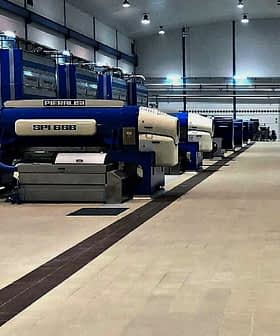Tunisian Olive Oil Producer Will Use Blockchain Technology to Fight Fraud
Combating food fraud and ensuring authenticity will be an important part of a company’s success moving forward.
CHO, one of the leading olive oil producers in Tunisia, is working with IBM and their blockchain technology to improve transparency and allow consumers to track the product from harvest to their kitchen shelf.
“The way we see it, it would really double down on that transparency factor for our consumer,” said Wajih Rekik, the CEO of CHO America, which distributes the Terra Delyssa brand of olive oil.
When (the consumers) scan the bottle it will show them the region, where the olives were harvested, when they were crushed, when the oil was filtered, when it was packaged, and when it was analyzed for shipment.
“We found that transparency was our second success factor,” he added. “We have tried to capitalize on that but there are not many ways really; there was blockchain [though]. And we thought that was really going to take us to the next level.”
Blockchain is a transaction tracking system designed to allow business owners, consumers or any other entity using the technology, to effectively track any transaction or product from the date of its creation to its final destination.
See Also:Olive Oil Technology NewsUsers of the technology, in this case CHO, record their information into “blocks,” which are then recorded into an online ledger – effectively chaining them together. Blocks can only be added to the chain, not deleted, thus keeping the information available and secure for review and transparency.
“Once we enter all the information, we cannot change it,” Rekik said. “So we are holding ourselves accountable, and that’s really one of the biggest parts of that veil of trust.”
In the case of Terra Delyssa, the technology will allow buyers to scan a QR code that will show them where the bottle that is in their hands was packaged, when and where the olives that produced its oil were harvested and when the finished product was shipped.
“When [the consumers] scan the bottle it will show them the region, where the olives were harvested, when they were crushed, when the oil was filtered, when it was packaged and when it was analyzed for shipment,” said Rekik.
The quality checks are not only meant for the consumers, however. CHO has made a separate portion of the blockchain data available specifically to distributors that will show all the aforementioned information as well as provide “access to the actual certificate of analysis,” according to Rekik.
Blockchain technology is a difficult process to put into practice, especially when there are many different steps to track. When harvesting olives and making them into olive oil, the tracking of so many distinct steps was a red flag for some providers of the technology.
“Some providers (of blockchain) made it sound like it is not going to happen in this decade; it is so complicated that an olive oil producer cannot implement it,” Rekik said. “IBM managed really to make it easy.”
The entire process creates eight total checkpoints that the blockchain will record: when the olives were picked, crushed, milled, and filtered; and once the oil has been analyzed before storage, the date of storage, when it is bottled, and the analysis after bottling.
Rekik hopes that, in the future, CHO will be able to provide all this information to prominent distributors, such as Whole Foods or Target, where the customer will be able to see it while purchasing their product.
The move shows the olive oil industry’s growing awareness that food fraud, olive oil adulteration and a brand’s handling of the two issues, will be an important part of a company’s success moving forward.
“I do not want to be the one endorsing that the olive industry is full of adulteration,” Rekik said. “I can only acknowledge that there is a big negative media attention around it… and we believe that this is going to be the way to go, this will be the future; you’re going to have to show the consumer where you did it, and how you did it.”








